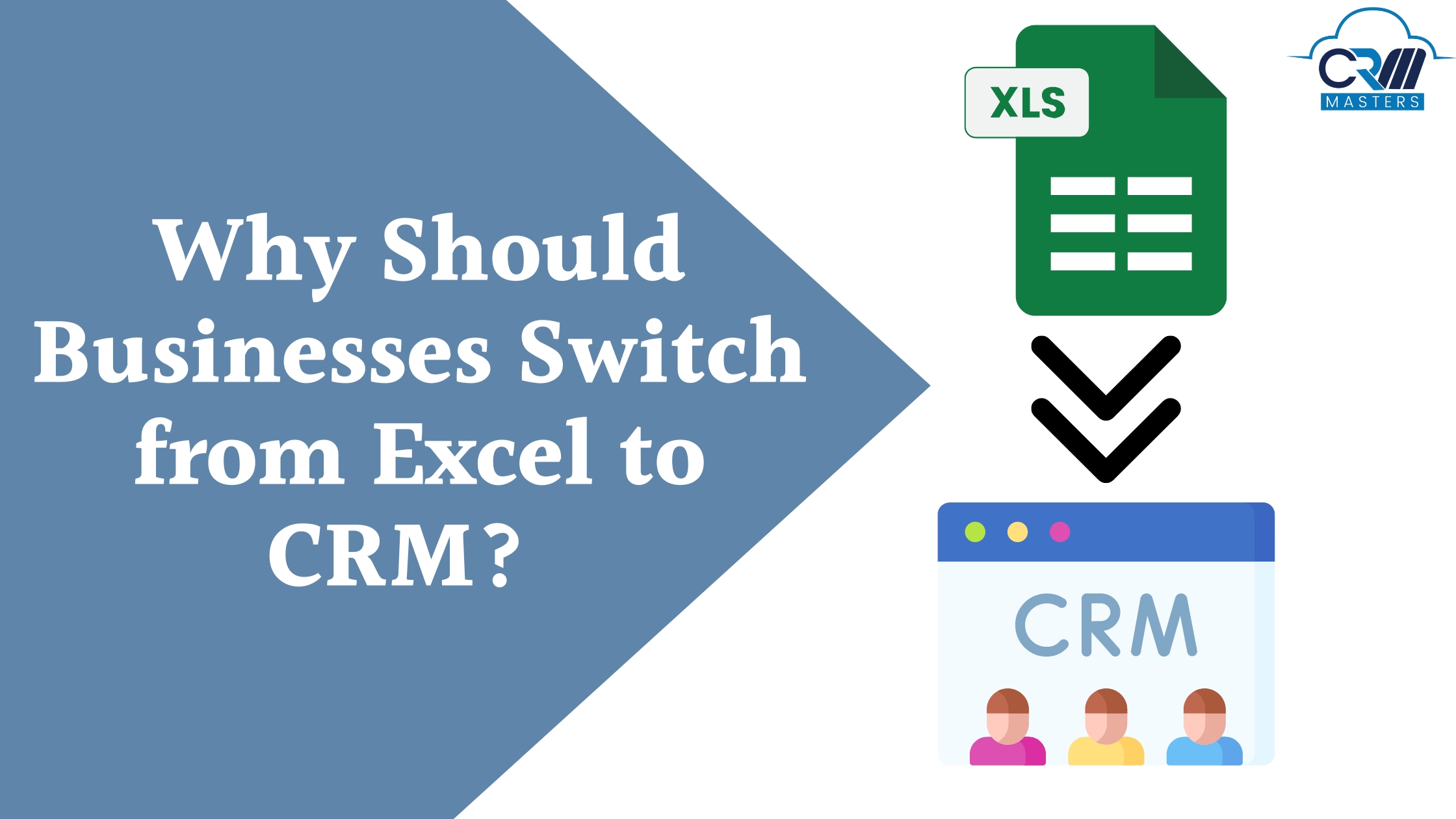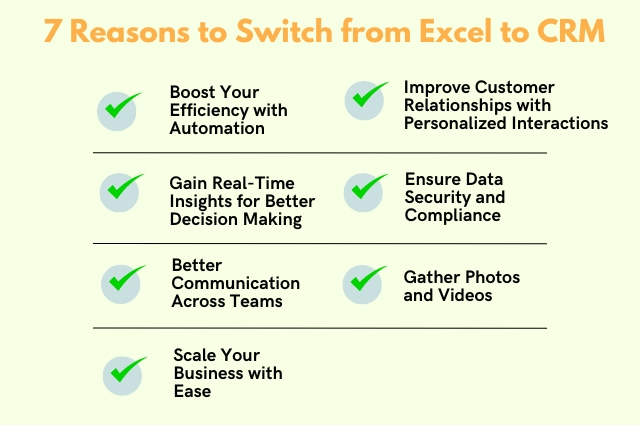
Why Should Businesses Switch from Excel to CRM?
In the early stages of a business, managing customer data with Excel spreadsheets might seem sufficient. They offer a familiar and straightforward way to track interactions and store information. However, as businesses grow and their customer base expands, the limitations of Excel become more apparent. From handling complex data to maintaining real-time updates, Excel can quickly become cumbersome and prone to errors.
Enter Customer Relationship Management (CRM) systems—powerful tools designed to streamline and enhance customer interactions and business operations. Unlike Excel, CRMs offer advanced features such as automated data entry, integrated communication channels, and detailed analytics that provide valuable insights into customer behavior and business performance. These functionalities not only save time but also promote better decision-making and improved customer relationships.
In this blog, we’ll explore why switching from Excel to a CRM is important for growing businesses. We will understand why using Excel provides you with limited features in comparison with CRM including increased efficiency, enhanced data accuracy, and scalable solutions that can adapt to your business’s evolving needs.
What is it Like to Manage Business Work in Excel?
For a long time, businesses have been using Excel to organize, present, and analyze data. Businesses use Excel sheets from tracking budgets and sales to managing inventories and project timelines.
However, relying completely on Excel is causing significant challenges for businesses as they grow and their needs become more complex.
Challenges Faced by Businesses Using Excel
- Scalability Issues: As data volume grows, Excel sheets can become unmanageable and slow. Large datasets may cause performance issues, and managing complex data in multiple interconnected sheets can lead to errors and inconsistencies.
- Version Control: Keeping track of changes made by multiple users can be problematic. Without a centralized version control system, businesses may struggle with conflicting data entries and outdated information.
- Data Integrity Risks: Manual data entry and formula errors can compromise data accuracy. Businesses may face difficulties ensuring data integrity, especially when dealing with complex calculations or large datasets.
- Security Concerns: Excel lacks advanced security features found in dedicated data management systems. Sensitive information may be at risk if not adequately protected, as Excel files can be easily shared or accessed by unauthorised individuals.
- Limited Integration: While Excel integrates with other Microsoft Office applications, it may not seamlessly connect with specialised business systems such as Customer Relationship Management (CRM) or Enterprise Resource Planning (ERP) software. This limitation can restrict the efficiency of data flow across different business functions.
7 Reasons to Switch from Excel to CRM
Switching from Excel to a CRM system offers effective advantages that can transform how you manage your business operations.
Here are the reasons why making the switch is a smart move for your business:
1. Boost Your Efficiency with Automation
One of the standout benefits of CRM systems is automation. Unlike Excel, which requires manual data entry and repetitive tasks, CRMs automate workflows and processes. This means fewer errors, less manual work, and more time for your team to focus on strategic tasks.
2. Gain Real-Time Insights for Better Decision Making
CRMs provide real-time data and complete analytics that Excel simply can’t match. With instant access to up-to-date information, you can make informed decisions faster, helping your business stay agile and responsive to market changes.
3. Better Communication Across Teams
A CRM centralizes your data, making it accessible to your entire team. This manages better collaboration and communication, as everyone works from the same information, reducing misunderstandings and ensuring all team members are on the same page.
4. Scale Your Business with Ease
Managing data and processes in Excel can become unmanageable as your business grows. CRMs are designed to scale your business, handling increasing volumes of data and complex workflows effortlessly, which makes expansion smoother and more manageable.
5. Improve Customer Relationships with Personalized Interactions
CRMs allow you to track customer interactions and preferences, enabling you to personalize your communication. This leads to more effective customer engagement and improved relationships, ultimately driving better business outcomes.
6. Ensure Data Security and Compliance
Data security is critical, and CRM systems offer advanced security features and compliance measures that Excel lacks. Protecting sensitive information and meeting regulatory requirements is easier with a CRM’s robust security protocols.
7. Streamline Your Processes with Integrated Solutions
CRMs integrate with various tools and platforms, streamlining your processes and eliminating the need for manual data transfer. This integration reduces errors and enhances overall efficiency, making your operations smoother and more cohesive.
By making the switch from Excel to CRM, you’re investing in a tool that enhances efficiency, collaboration, and security while supporting your business’s growth and success.
How To Migrate from Excel to CRM?
Migrating from Excel to a CRM system can greatly enhance your business operations, offering advanced features and simplifying processes.
Here’s a step-by-step guide to make your transition smooth and effective:
1. Audit Your Data
Minimize complexity and migration costs by carefully assessing your current data. Consider whether outdated contact email templates from past branding efforts are necessary for import.
Start your data migration checklist by reviewing your data, and deciding what to keep or discard. Clean up the data you choose to retain, but always back it up before making any changes to avoid potential issues.
2. Data Cleaning
Before going further into data migration, take time to understand your new CRM system. Each CRM has its own data formatting and import processes. Learn how your data will be organized and stored in the new system, and categorize it accordingly.
For example, existing customers and leads may need to be stored in different areas of the CRM. Be prepared for differences from your previous CRM and adjust the import process to fit the new system’s requirements.
3. Field Mapping
Once you have determined where your data will be stored, proceed with data mapping. This step involves aligning fields from your old database with those in the new CRM. In this way, accurate data transfer is ensured and custom fields are not lost.
4. Test Migration
Before migrating all your data, conduct a test migration with a small dataset. Import this test data into the new CRM and review it thoroughly for errors. This trial run helps identify potential issues early and allows you to correct them before the full migration. If problems arise, troubleshoot and re-test until the process is smooth and successful.
5. Seek Professional Help
If You might think that migrating data from Excel to CRM is a complicated, time-consuming task or you want to do this under the guidance of a professional so that errors can be avoided, CRM Masters is here to help.
We have 8+ years of experience in providing our clients with business automation solutions with cloud CRM, ERP, and E-Commerce for their business needs.
Some of the Best CRM in 2024
-
Salesforce CRM:
Salesforce is a leader in CRM and continues to perform well in the global market. It offers a wide range of features to meet any CRM need. Nowadays, thousands of small and large companies rely on Salesforce to run their business operations. If you want to get a hand start with Salesforce, contact CRM Masters. We are a Certified Salesforce Partner and have been helping out businesses like yours for years.
-
Zoho CRM:
Zoho provides a complete suite of SaaS business solutions, with its CRM standing out as a top tool. Zoho also offers a bundle called Zoho CRM Plus, which comes with business solutions for marketing, sales, business processes, and support, to deliver personalized experiences for your customers. Zoho CRM Plus comes with a lot of advantages that help your business to grow more.
-
HubSpot CRM:
HubSpot CRM is well-known for its user-friendly interface and powerful features. It provides a seamless experience for managing contacts, sales pipelines, and marketing campaigns. HubSpot CRM’s free tier is a great starting point for businesses of all sizes, with the option to upgrade as your needs evolve.
-
Freshsales:
Freshsales offers an intuitive CRM platform with strong automation features and AI-powered insights. It is designed to streamline your sales processes, enhance productivity, and provide actionable data to drive growth. Freshsales is known for its ease of use and effective lead management capabilities.
-
MS Dynamics:
Microsoft Dynamics 365 integrates CRM and ERP capabilities to provide a comprehensive solution for managing customer relationships and business operations. Its flexibility and deep integration with other Microsoft products make it a powerful tool for businesses looking for an all-in-one solution.
-
Pipedrive:
Pipedrive is designed with sales teams in mind, offering a visual sales pipeline and user-friendly interface. Its focus on simplicity and effectiveness helps teams manage their deals and track their progress easily. Pipedrive is ideal for small to mid-sized businesses seeking a practical and intuitive CRM solution.
Conclusion
Running your business with traditional spreadsheets comes with many limitations. While they might work when you’re just starting, as your business grows, using Excel as a CRM becomes increasingly challenging. If you’re finding it hard to manage within the limitations of Excel sheets, it’s time to consider a change.
Contact CRM Masters today to explore how we can help your business become more efficient and transition away from Excel. We can recommend the best CRM software tailored to your needs. Get in touch now!
Sweet Bonanza 1000 shining crown Shining Crown matbet Sweet Bonanza 1000 Fortune Rabbit pusulabet chicky run chicky run apk













